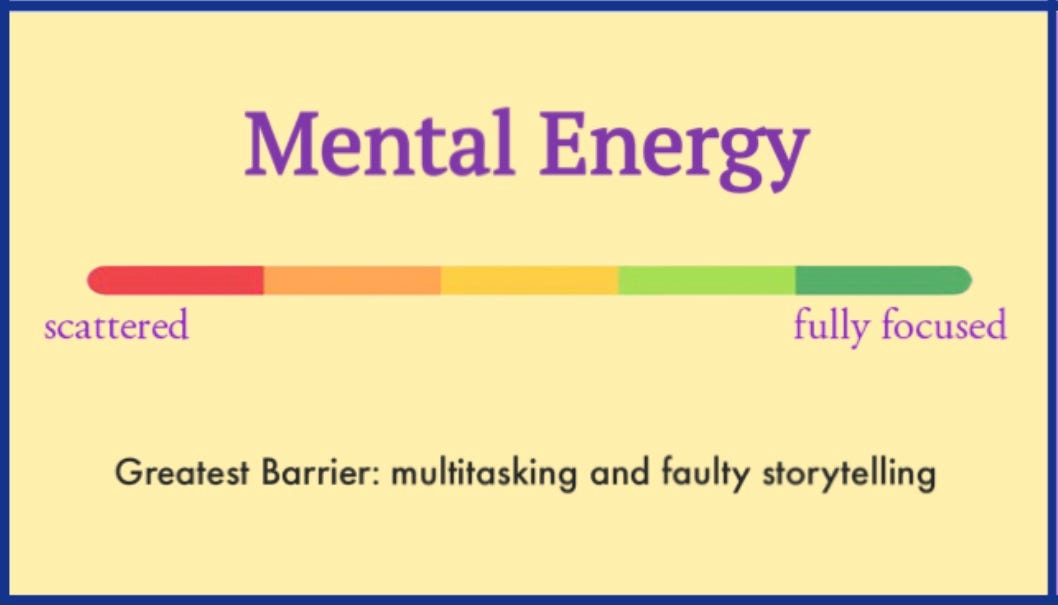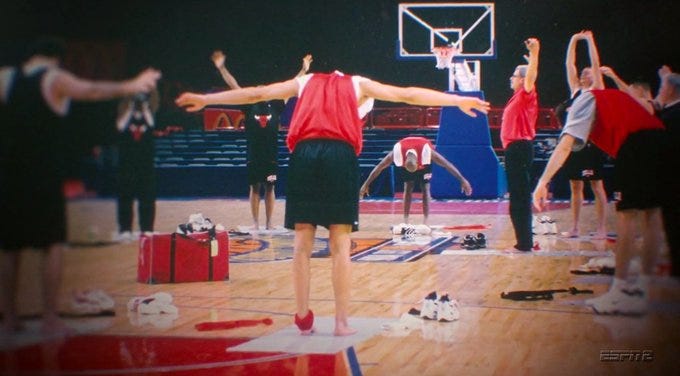Every other day I prepare a protein shake for breakfast. One of those mornings, after enduring a string of disappointments that week, I found myself completely distracted and on the verge of adding grits to the blender instead of protein powder. What snapped me out of it was the fact that I keep a scoop with the protein powder. When I saw no scoop, I was a little confused. Then I realized I grabbed the container of grits instead of the protein powder.

Later that day I nearly ran a red light with people in the crosswalk! The next morning I couldn’t find my bathrobe because my distracted mind the day before led me to hang it on the back of my bedroom door instead of it’s usual spot on the back of the bathroom door. I had it bad!
Back to the day before…
Upon realizing that I nearly ran a red light, I had to snap myself out of the haze I was experiencing by snapping into mindfulness in order to maneuver safely. Once I returned home, I strategically disengaged by declaring myself done for the day and spent the rest of the day vegging out. Strategic disengagement is a core aspect of overall energy management. And a core aspect of mental energy balance is the ability to focus. The barriers to mental energy balance are multitasking/distractions and faulty story telling.

I am a very thoughtful person. Not just thoughtful as in considerate, but thoughtful as in full of thoughts. Like many, when I am in distress, certain thoughts are hard to turn off and become distractions that throw me off balance. Also like many people, I didn’t always know how to turn those thoughts off. I almost convinced myself that mindfulness, particularly meditation, was impossible for someone with such a high level for thoughtfulness.
After hearing a similar sentiment from many others, I began to wonder if mindfulness was an individual results may vary type of proposition. I also began to think that mindfulness, particularly meditation, was some over-hyped spiritual idea that had no real impact on stress-filled realities. It also took on a trendy feel making it seem even more trite to me. So after trying and failing at it numerous times, I chalked it up as something that simply did not work for me.
Sometime later I felt inclined to try it again. This time I was actively exercising and strength training. Did my increase in physical activity predispose me to becoming a successful meditator? Not hardly…
But exercising, particularly the strength training aspect of my workouts, gave me a better framework to understand the practice of mindfulness. Strength training is all about muscle development. I also understood that a barrier to mental energy balance was a distracted mind. Then it occurred to me that mindfulness was simply focus training and meditation was simply a mindfulness exercise.
The idea of being mindful was actually not new to me. My thoughtfulness is actually a result of applied mindfulness. My thoughtfulness is intentional because I try to be mindful to apply the lessons I have learned However, this idea of being overly conscious of minutia did not make sense to me. What did make sense though is the idea that our ability to focus could be strengthened if we trained it to be.
Though I cannot explain it scientifically, I believe we have an innate ability to focus when we are intrigued or fascinated by something or someone. However, that innate ability proves to be insufficient when our mental energy is taxed with distractions. Distractions are inevitable but we cannot afford to allow distractions to overwhelm us.
Had I run that red light, someone could’ve have been fatally injured and I would’ve found myself living an even greater emotional, legal, and financial nightmare. The stakes may not always be life or death but we often find ourselves in relatively high stakes scenarios where we cannot afford to lose focus.
Athletes are beginning to incorporate mindfulness exercises in their training. Legendary coach, Phil Jackson, began incorporating it with his championship winning teams before it became popular. Though I’m not so so sure he explained it in plain terms as I have done, because many of his players were skeptical. Had they understood how it could improve their performance, I doubt they would’ve been as skeptical.

The ability to focus isn’t the only benefit we experience with mindfulness. Some additional benefits include:
lower blood pressure
slower cellular aging
lower risk of cognitive decline
less chronic pain
elevated mood
enhanced sleep
Thus far I haven’t learned of any downsides to practicing mindfulness. Probably the most negative feedback associated with it is the idea of it being frivolous and woo-woo and that it simply does not work for some. This entire post is my response to the former and my response to the latter is it takes time to get the hang of it. Just as it takes time to strengthen any weak muscle.
I’ll also add that many find the stereotypical posture and practice of mindfulness meditation to be awkward. That certainly was my experience. But once I realized that is was focus training and a way to trigger my parasympathetic nervous system, I pretty much create my own mindfulness exercises. I may pick a random object and begin focusing on it noting it’s color, shape, texture, etc. I will count backwards. Instead of reaching for my phone while watching a movie, television or even having a conversation, I will give my undivided attention. I’ve even noticed that when I’m entranced by a movie my FitBit registers me as sleep because my heart rate has slowed down.
Throughout the day and especially before I go to bed, I take deep breaths. Lately, I’ve adopted the breathing exercise that actress, Sanaa Lathan shared on Tiktok.

 Tiktok failed to load.
Tiktok failed to load.Enable 3rd party cookies or use another browser
The last eye-opening revelation that I’d like to share is that the idea of multitasking is essentially placing a positive spin on being distracted. Yes there are times when it can be done effectively. And many people believe they are saving time by multitasking. However contrary to popular belief it is a serious drain on our mental energy and can lead to devastating consequences.
The authors of The Corporate Athlete Advantage give us a rule of thumb to abide by:
Multitask when the outcome does not matter. If the outcome does matter, then do not!
And I’m sure we all have life experiences where that principle has been proven true.
Onward with mindfulness and Harmonious Balance, my friends!
Johanna
**For customized content requests,1:1 coaching and/or speaking inquiries, feel free to contact me.**







I love so many things in this essay. I love the framing of being a thoughtful person - such positive framing for an anxious or neurodivergent mind. I also love how you described mindfulness as applying intentional thought, something we can do at any given moment, brinding meditative moments through our awareness and thoughtfulness - not necessarily absence of thought. Lovely. 🤎
Thank you so much for sharing this article in the comments. It is so fitting and synchronous. Every time you said thoughtful. My brain read it as thoughtFULL. I am thoughtFULL person too in addition to the other definition you described, compassionate person.
This is why meditation/mindfulness in a non traditional sense is so important for me. It is a way to slow my mind down and deprogram it from wanting to multitask which is something honed for many years. I have moved away from moving so fast/hustling and people/relationships/societal constructs that trigger me to move in that way.
This post was a great breakdown! Maybe consider resharing it in one of your notes.